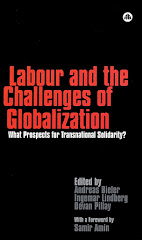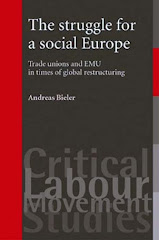Friday 27 December 2013
Crucible of Resistance: Class struggle over ways out of the crisis.
Monday 16 December 2013
The Election of Matteo Renzi and the Future of Italian Trade Unions
Matteo Renzi, mayor of Florence, was recently elected leader of the
Italian Partito Democratico
(Democratic Party). All Italians could vote in the contest. Between two and
three million Italians (depending on your sources) turned out to cast a vote in
the leadership contest with Renzi amassing almost 70% of the vote. With this
clear mandate Renzi, at 38, becomes the youngest general secretary of the PD.
His criticism of the political class has been scathing and the venom was not
reserved for rival political parties. Instead of sparing his left-wing cohorts
Renzi built his campaign around the idea that the PD needed a root-and-branch
renewal. In this guest post, Darragh Golden assesses the implications of Renzi’s
appointment for Italy’s largest left-wing party. Moreover, how will the
relationship between political party and trade unions evolve? And what will the
implications be for Italian parliamentary democracy in the immediate future?
Friday 13 December 2013
LO Sweden: Can an Old Model be Renewed?
LO Sweden is
starting a high-level commission on a “new Swedish model”. Long ago, Sweden was
known for what was called the Rehn-Meidner model. The idea was that union wage
strategies and government policy should be combined to promote full employment
and fair distribution while respecting the autonomy of unions and employers.
The basic element was a “solidaristic” wage policy which would raise the income
level of low-income groups and simultaneously speed up structural change and
thereby create more jobs in the future. Unemployment benefits and active labour
market programmes would give workers security in the process of change; a
“security of the wings”, as Gösta Rehn, LO economist at the time, phrased it.
In this guest post, Ingemar Lindberg
discusses the huge task of this new commission: How to re-establish a strategy
for these goals in our times?
Monday 9 December 2013
Confronting Neo-liberal Capitalism: SIGTUR’s tenth Congress in Perth/Australia, 2 to 6 December 2013.
Last week, I
attended the tenth Congress of the Southern
Initiative on Globalisation and Trade Union Rights (SIGTUR) in
Perth/Australia, 2 to 6 December 2013. SIGTUR is a network of more militant trade
unions from the Global South with a focus on South-South co-operation. In this
post, I will reflect on SIGTUR’s achievements, problems as well as
possibilities for the future on the basis of the exchanges at this Congress. I
will argue that it will only be through joint campaigns against capitalist exploitation that relationships of
solidarity can be established through SIGTUR more widely.
Labels:
Argentina,
Brazil,
capitalism,
class struggle,
COSATU,
free trade,
oslo project,
public sector,
resistance,
SIGTUR,
social movements,
South Africa,
TNCs,
Trade Unions,
transnational solidarity,
welfare state
Subscribe to:
Posts (Atom)











